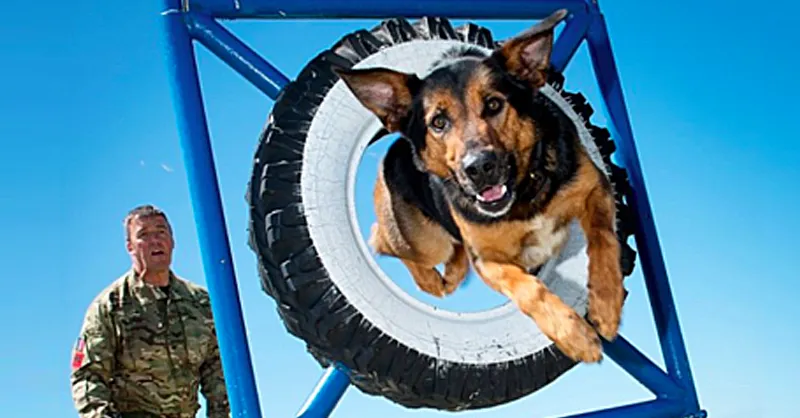Archive for the ‘News’ Category
Training a service dog can be a costly venture, but for those that need the help of a specialized canine, it’s priceless. However, it’s difficult to put a specific price on training a service dog. In this post, we are going to cover the basics to give you a better idea of what having a service dog entails, both for your own canine and one specifically purchased or adopted for service.
How Much Will it Cost to Train My Dog to be a Service Dog?If you already have a dog and want to have him trained for service, the cost will depend on the dog itself (how much obedience the dog has learned) what the tasks are your dog will need to perform (will he be alerting, helping with simple tasks or there for emotional support) and how much time you or a handler can devote to training your service dog.
For a canine with previous obedience training, it can take anywhere from four to six months to be trained just for a task service, but again this will depend on exactly what the dog needs to accomplish and how fast he can pick up on the training. In addition, the canine will also be expected to be able to perform these specific tasks in different environments – most dogs can take up to two years to become fully trained for public access. A public access test certifies if the service dog is ready to face any public setting.
Depending on what part of the world you are in, professional dog trainers can start around $150/hour up to $250/hour. This can run into thousands of dollars and will, once again, depend greatly on the dog you are training for service and what he needs to be able to perform.
Service dog in training How Much Will it Cost to Receive a Service Dog?If you want to take the other route and apply for a dog that is already trained for service, you are looking at an even higher cost.
Service dogs are usually chosen from a breeder that breeds the canines just for the service industry. That means the parents of these dogs and their offspring have shown the qualities that are sought after in a trainable/service dog. However, not all service dogs start out from service-stock, some can be chosen from other sources because they demonstrate the proper skills (ie temperament, intelligence, willingness to learn etc.) needed to be a service dog.
Most service dogs start off their training as a puppy and go through the basic obedience and social skills needed to be a service dog. At around 6 months of age, the puppy will then be put into the hands of a trainer that can take the dog into the next phase of its training. These would include task and public access skills. Once the dog has mastered all of the skills it needs, it will be ready to help a person needing a service canine.
As you can imagine, the cost of taking a puppy and training it up into the ways of a service dog is not cheap. In fact, again depending on your location, specialized service dogs can run upwards of $25,000 dollars. This includes the cost of the puppy, medical bills, training and the fees it entails to apply for a service dog.
If you need a service dog for alerting or emotional support, then the costs may be considerably lower, as these types of canines do not receive the intense training a dog would for a physically disabled individual.
Service Dogs & YouIf you feel you may benefit from a service dog, ask your healthcare provider if he/she agrees that your condition mitigates having one of these canines. Your doctor will have to put in writing that your disability fits under the required definition of “disabled” in your country. You will then have to go through an agency to get your service dog, where you will be asked more questions regarding what exactly you will need the dog to do for you. This helps the agency determine how specialized the dog will need to be in order to help you. Once all your paperwork is in order, then you will be put on a list for your service dog, and usually (depending on the agency) a down payment and applicable fees will be required of you to pay at that time.
Can You Put a Price on Your Wellbeing?Service dogs help those that are physically or mentally challenged live a better life. Yes, service dogs can be costly, but allowing a person to gain back their independence and giving them the opportunity to do and be all they can be, well, that’s priceless.
If you are not ready to train your dog to become a service dog, you may be interested in certifying your dog to become an Emotional Support Animal. For more information on Emotional Support Animals, here is a helpful article.
Have you recently gotten a pet or are pondering the idea of adding one to your life? Then you’ll want to have a good veterinarian to look after your new bundle of furry-fun. But finding the right pet doctor for your new addition may not be as simple as looking through a directory and calling the first number that pops up. You’ll want to do some research first. In this post we’ll be covering some tips to follow and some questions to ask of your pet’s potential doctor. Here’s how to find the right veterinarian.
Get Pet Parent Opinions
Whether it be from family, friends, co-workers or the place/person you get your new pet from, ask if they know of any good vets. Pet parents are usually quick to share both good and bad experiences, so don’t be shy when you’re searching for your own pet professional.
Friendly and Open
You’ll want all the people you deal with at the veterinarian’s office (from front desk to vet techs and the doctor him/herself) to be open and friendly. Look for a calm nature and one that is at-ease with your pet. Also be sure to observe how your pet responds to the veterinarian. Yes, your animal may be nervous, but a good veterinarian will try to have a good rapport with your animal before doing anything invasive or “scary.”
Busy is Good
It may be frustrating to be denied the appointment date you wanted, then not be able to find a parking place when you do finally get to the office or an available seat to wait for the vet; however, this is a good thing. Busy veterinarian’s are tied-up for a reason…they’re good! Take this as a clear sign that this pet doctor has more going for him/her than just a fancy ad or web site.
Ask About the Cost
When your pet becomes seriously ill is not the time to find out about the cost and payment methods your potential vet has in place. Inquire about this when you are in the first stages of searching for a veterinarian to avoid a shock at the front desk.
After Hours & Emergency Policies
Another upfront inquiry you will want to make is about the office’s hours of operation and what their emergency policies are. If a vet only works a few days a week, or has no emergency contingency plan, then you may want to move on in your search for the right vet.
Location
Having your veterinarian “right around the corner” is convenient, especially if you have an emergency situation. However, don’t base your decision on the right vet just because he/she is close by.
Questions to Ask a Potential Veterinarian
You most likely wouldn’t let a surgeon operate on you without asking some important questions first, so do the same when you’re looking for the right veterinarian. Remember, you are your pet’s voice, so ask these questions before you make your final decision;
Is the vet accredited through the American Animal Hospital Association (AAHA) or the equivalent in your country? What type of equipment does the veterinarian have and will they keep up-to-date on the newest technologies when they become available? Who (if anyone) monitors the overnight patients? How are they treated/housed etc.? How does the veterinarian assess a pet before an operation in regards to anesthesia and post-op care? What do they regard as pain-management? Will this vet refer you to a specialist if your pet needs one? If you have an exotic pet, be sure to ask the potential vet if he/she has experience dealing with that type of species.This is a good start of important questions to ask a potential veterinarian and they should be eager to answer any and all questions you may have in addition. If the pet doctor you are speaking with is reluctant to answer your questions or gets evasive or rude, move on. This person could be a problem down-the-road.
Finding the Right Veterinarian – Do Your Research
Take the time to follow these helpful suggestions to find the right vet for you and your animal-baby. When you’re pet parenting having the right doctor by your side can make all the difference in having a good pet and having a great pet!
Although service dogs for the deaf and blind have been used for decades, doctors and mental health professionals are now attesting to the benefits dogs (and other animals) bring to individuals that need emotional or stress-relieving help.
However, since this practice of emotional and therapy pooch is relatively new, we tend to clump the jobs these animals do into one category. Sure, we know these dogs are important to the individuals they are helping, but do we know the difference between service dogs, emotional support animals, and therapy dogs?
Share this image on your site (copy code below): <div style="clear:both"><a href="#" target="_blank"><img decoding="async" style="max-width:100%;margin:0 0 10px;" src="" title="" alt="" border="0" data-src="" /></a></div> Copy
We’ve consulted with the experts to clear up the mystery and misunderstanding of this important trio.
What is a Service Dog?According to the organization, ‘Please Don’t Pet Me,’ a service dog is defined as a canine assistant that helps those with physical disabilities. This can include those folks in wheelchairs, limited vision or hearing, epilepsy, and a wide array of other physical health problems. This type of dog works to help the disabled person do things and live a life they may not be otherwise able to do.
This type of human/canine partnership is protected by The Americans with Disabilities Act (ADA), DOT’s Air Carrier Access Act, DOJ/HUD Fair Housing Act and Federal Rehabilitation Act. These laws ensure the canine will be granted access to public buildings, airlines, and no-pets apartments/condos.
A service dog should not be petted by strangers when on duty, as this can be a distraction to the animal, which could cause harm to the disabled person.
Since service dogs are highly trained from an early age, obtaining a service animal can be quite costly. Most organizations quote around $20,000 for a service dog. Depending on your country and city of location this fee may be paid by individual fundraising, government programs, or the service dog organization itself. If you are unable to afford a professionally trained service dog, you may train your service dog yourself.
What is an Emotional Support Animal?
Unlike a service dog, the emotional support animal does not have to be highly trained to do its job. The main focus of an emotional support animal is to be there to provide unconditional love, support, companionship, and friendship for the person with a psychological disorder. The idea behind this type of partnership is to help individuals who may suffer from severe depression, anxiety issues, or debilitating stress. A doctor, mental health professional, or psychotherapist can prescribe an emotional support animal for the person in need.
The role of the emotional support animal isn’t always awarded to a dog. It can be a cat, bird, turtle, rabbit, or even a horse.
According to ESA Doctors, these animals are allowed into ‘no pets allowed’ housing as long as they have an ESA letter or document from a mental health professional.
How Can I Get an ESA Letter Online? What is a Therapy Dog?A therapy dog is also trained but for a different purpose. This dog should be naturally friendly, easy-going, loving, and able to handle any situation from calm to chaotic. The therapy dog is used for the sole purpose of bringing stress-relief to those in need. This can include schools, hospitals, nursing homes, hospices, and more. Therapy dogs are accompanied by a handler (usually the pet parent) and can be interacted with; in fact, it’s encouraged.
The role of the therapy dog can vary from visit to visit, depending on where it is needed. Therapy dogs are used in grade schools to encourage reluctant students to read aloud; they may sit with patients that are critically ill or just in need of a pick-me-up, as well as actively participate in someone’s physical rehabilitation.
Albeit an important type of service, therapy dogs are not usually allowed into public places, airlines, or living quarters where ‘no pet’ policies are in place.
The Importance of Assistance AnimalsThe dog and human bond go way back in time, so it’s only natural that we would integrate them into the service world. Dogs have a special intuition that allows them to know when a person is hurting emotionally, physically ill, or disabled. And for this, we are truly blessed to have the lovable canine to be our partner in life.
Whether you need a service dog, emotional support animal, or therapy dog, the canine is always on duty.







